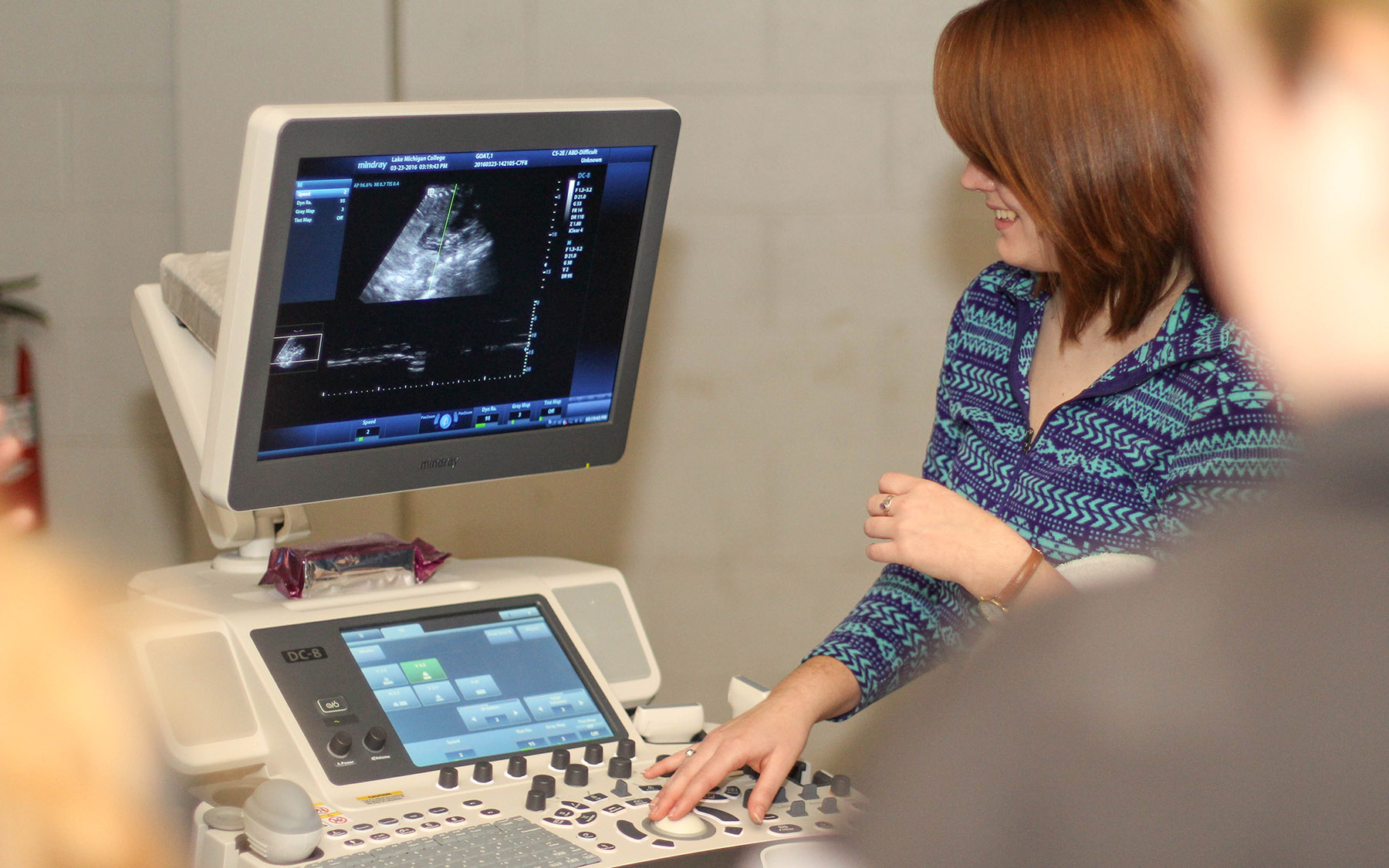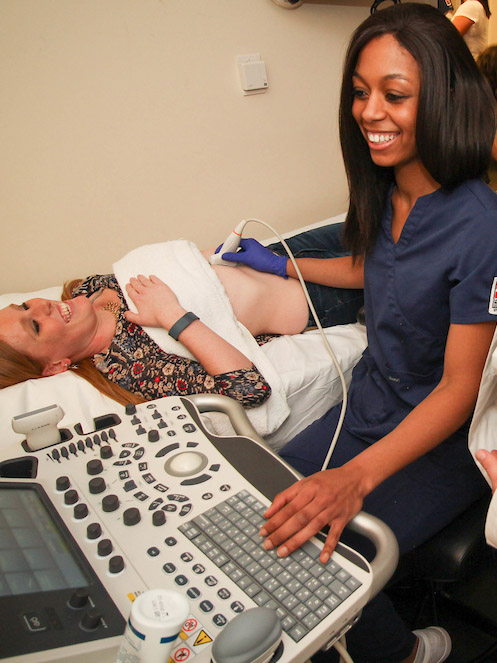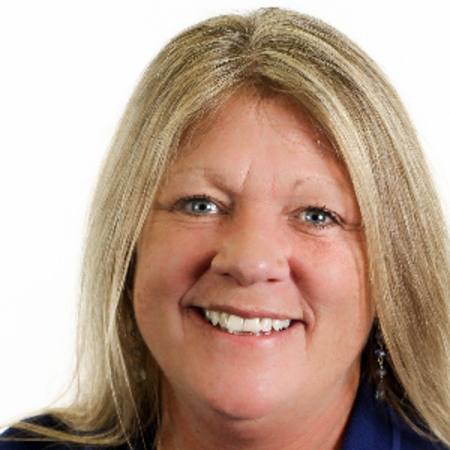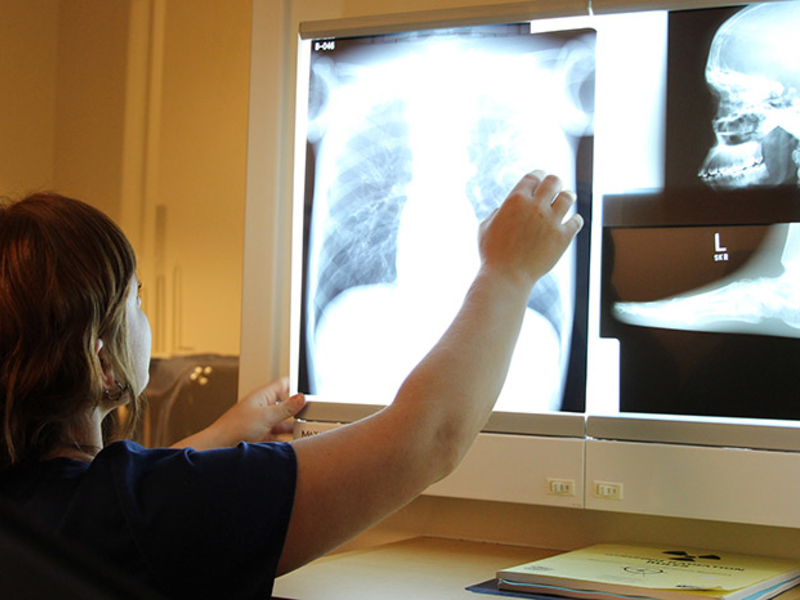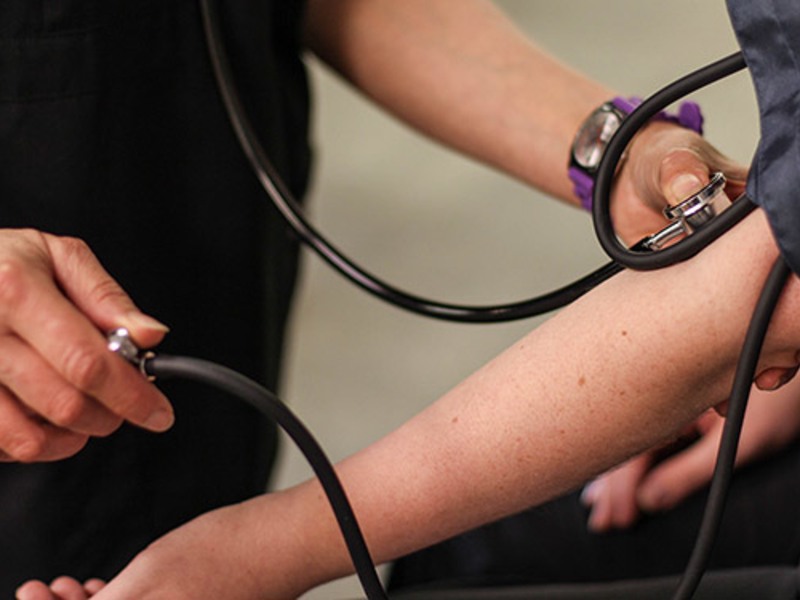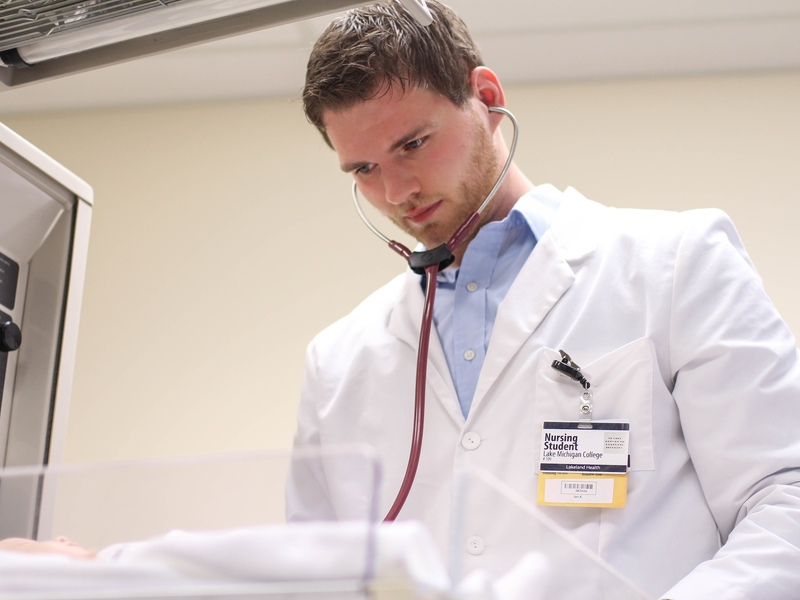Sonography Program Information
This guide will help guide you through the prerequisites and application process for the Lake Michigan College Diagnostic Medical Sonography Program. But if you still need help...
Contact Health Sciences
Prospective students are strongly encouraged to contact an academic advisor before starting any prerequisite testing and coursework. Students can send questions to advisor@lakemichigancollege.edu.
Contact the Health Sciences Office for more information about the Sonography Program using the button above or find them at:
Health Sciences Office
2755 E. Napier Avenue
Benton Harbor, Michigan 49022
(269) 927-8768
What is Diagnostic Medical Sonography?
The overarching goal of the Sonography program is: to prepare competent entry-level sonographers in the cognitive (knowledge), psychomotor (skills), and affective (behavior) learning domains for the Abdominal Sonography-Extended concentration and to prepare competent entry-level sonographers in the cognitive (knowledge), psychomotor (skills), and affective (behavior) learning domains for the Obstetrics and Gynecology Sonography concentration.
Diagnostic medical sonography (DMS) is a multi-specialty occupation comprised of abdominal-extended sonography, adult cardiac sonography, breast sonography, musculoskeletal sonography, obstetrics and gynecology sonography, pediatric cardiac sonography, vascular sonography, and other emerging clinical areas or concentrations.
These concentrations all use a comprehensive knowledge of ultrasound technology in their daily work. The trained technologist is an individual who provides patient care services applying ultrasound technology in the performance of diagnostic and/or therapeutic exams and procedures. As an occupational prerequisite, the diagnostic medical sonographer must be educationally prepared and clinically competent.
Demonstration and maintenance of competency through certification by a nationally recognized credentialing organization is the Standard of practice in sonography. Maintenance of certification in all areas of practice is endorsed.
The diagnostic medical sonographer functions as a delegated agent of the physician and does not practice independently. Diagnostic medical sonographers are committed to enhanced patient care and continuous quality improvement that increases knowledge and technical competence. Diagnostic medical sonographers use independent, professional, and ethical judgment and critical thinking to perform diagnostic procedures.
Sonographers work as a team with the physician in collecting sonographic data for the purpose of diagnosing. According to the Commission on Accreditation of Allied Health Education Programs (CAAHEP), the diagnostic medical sonographer:
- Obtains, reviews, and integrates pertinent patient history and supporting clinical data to facilitate optimum diagnostic results;
- Performs appropriate procedures and records anatomic, pathologic, and/or physiologic data for interpretation by a physician;
- Records, analyzes and processes diagnostic data and other pertinent observations made during the procedure for presentation to the interpreting physician;
- Exercises discretion and judgement on the performance of sonographic and/or related diagnostic services;
- Demonstrates appropriate communication skills with patients and colleagues;
- Acts in a professional and ethical manner;
- Facilitates communication and education elicit patient cooperation and understanding of expectations and responds to questions regarding the sonographic examination.
Program Mission
The mission of the Diagnostic Medical Sonography program at Lake Michigan College is to provide our students with personal and professional career development in the field of sonography and to prepare competent entry-level sonographers in the cognitive (knowledge), psychomotor (skills), and affective (behavior) learning domains.
The program mission aligns with the Lake Michigan College mission to empower people to thrive through education, innovation, and experiences. In conjunction with the College’s mission, the program strives to meet the community need for skilled, competent Diagnostic Medical Sonographers.
Program Goal
The overarching goal of the Diagnostic Medical Sonography Program at Lake Michigan College is:
"To prepare competent, entry-level Abdominal - Extended and Obstetric and Gynecologic sonographers in the cognitive (knowledge), psychomotor (skills), and affective (behavior) learning domains."
Employment Outlook
- Employment is expected to grow 13% through 2030, faster than average for all occupations.
- The median salary for a Diagnostic Medical Sonographer is $89,340.*
- As the population ages, more sophisticated medical care is needed to meet their needs.
- Hospitals will remain the principal employer. Employment in offices, outpatient imaging centers and mobile companies will rise. Replacements for retiring professionals will rise.
* SOURCE: Bureau of Labor Statistics – bls.gov, accessed February 2026
Accreditation
The Diagnostic Medical Sonography Program is accredited by the Commission on Accreditation of Allied Health Education Programs upon the recommendation of the Joint Review Commission on Education in Diagnostic Medical Sonography.
Commission on Accreditation of Allied Health Education Programs (CAAHEP)
9355 - 113th St. N, #7709
Seminole, FL 33775
Phone: 727-210-2350
Fax: 727-210-2354
Visit the CAAHEP website
Joint Review Committee for Diagnostic Medical Sonography (JRC-DMS)
6021 University Boulevard, Suite 500, Ellicott City, MD 21043
Phone: 443-973-3251
Fax: 866-738-3444
Visit the JRCDMS website
Credentialing Information
Upon successful completion of the 18-month Sonography program, graduates will receive the Associate in Applied Science (AAS) Diagnostic Medical Sonography degree. Students will be eligible to sit for the ARDMS examinations within 60 days of program completion.
American Registry for Diagnostic Medical Sonography (ARDMS)
51 Monroe St, Plaza East One
Rockville, ML 20850-2400
(301) 738-8401
Visit the ARDMS website
Prerequisites
Entrance Requirements Checklist
Learn about the program
|
| Complete an LMC application for admission |
| Contact an academic advisor to discuss Sonography Program requirements |
Have high school transcripts sent to LMC Records Office
OR Have official college transcripts sent to LMC Records Office |
| Have SAT/ACT scores sent to LMC and/or take Accuplacer Assessment to meet basic college requirements in reading, English, and math |
| Have high school diploma or GED |
| Be at least 18 years old or older by the time you start Sonography program classes |
Complete Prerequisite Ranking Courses with a "C" or higher
LMC overall GPA must be 2.5 or greater in order to apply to the program
|
| PHSC 101 |
| BIOL 110 |
| MATH 122 or 123 |
| ENGL 101 |
| PSYC 201 |
| HEAL 103 or READ 110 |
Apply to the Program
|
| Meet with the Sonography Program Director for a mandatory pre-application advising appointment (call 269.927.8768 to make an appointment) |
| Successfully complete ALL paperwork, testing, and prerequisite and pre-program coursework prior to the application deadline on February 1 |
| Hold an Overall GPA of 2.50 or higher |
| Submit Diagnostic Medical Sonography application to LMC Health Sciences Office by the application deadline on February 1 |
*If BIOL 110 and/or PHSC 101 is over 10 years old by the application deadline, students must repeat the course(s)
**If MATH course is over 5 years old by the application deadline, students must complete the Algebra Proficiency (APRO) test offered through the LMC Testing Center with a score of 75 or higher.
Course Sequence – Before Admission
| |
Credit
Hours |
Contact
Hours |
Prerequisite Courses
(must complete prior to Application Deadline)
|
| PHSC 101 Physical Science: Chemistry and Physics |
4 |
5 |
| BIOL 110 Human Anatomy & Physiology |
4 |
5 |
| MATH 122 Intermediate Algebra or MATH 123 Quantitative Reasoning |
4 |
4 |
| ENGL 101 English Composition |
3 |
3 |
| PSYC 201 Introduction to Psychology |
3 |
3 |
| HEAL 103 or READ 110 Medical Terminology |
1 or 2 |
2 |
Pre-Program Courses
(must be completed before starting DMSO classes)
|
| ENGL 102 English Composition |
3 |
3 |
| Humanities/Fine Arts elective* |
3 |
3 |
|
*Includes any course of 3+ credit hours in one of the following subject areas: Art, Communications, Drama/Theatre, Foreign Language, Humanities, Music, Philosophy, or 200-level English.
|
|
|
Total Prerequisite and Support Course Credit and Contact Hours
|
25 |
28 |
Applicants MUST hold a minimum of a 2.50 Cumulative/Overall GPA to be considered eligible for admission. If a student has taken any one of the outlined prerequisite ranking courses listed above at LMC, the LMC GPA will be used. If no applicable coursework has been completed at LMC, the transfer college GPA will be used. Applicants must complete or be enrolled in pre-program courses noted above. Enrollment and final grades will be verified.
Application
A student will receive an email acknowledgement upon receipt of their Sonography application. All prerequisites must be completed before an applicant can be considered for the Sonography program. All eligible applicants’ academic records are evaluated by using a numerical point system. Entry into the Diagnostic Medical Sonography program is competitive and based on total points. Students who are not accepted into the Diagnostic Medical Sonography program will be required to submit another Sonography Application if they want to be reconsidered for the Sonography program for the next academic year.
Students should keep their contact information up to date in WaveLink, and should inform the Health Sciences Office of any changes. If the Health Science Office is unable to contact a student related to placement into the Sonography program, a student may have to forgo placement that year after reasonable attempts have been made to contact the student.
Selection for Admission into the Sonography Program
The selection process was established to enhance student success in the Sonography curriculum and passing scores on the American Registry for Diagnostic Medical Sonography (ARDMS) national certification exam.
All eligible students will be ranked via a point system and selected based upon a competitive process ranking them according to their GPA in the prerequisite courses: MATH 122/123, BIOL 110, PHSC 101, ENGL 101, HEAL 103/READ 110 and PSYC 201. The students cumulative GPA will also be ranked using a point system. Should two individuals qualify for the same seat, the cumulative GPA will determine the ranking.
Students seeking Advanced Standing or Transfer from another Sonography program: Lake Michigan College does not offer an advanced standing or transfer-in pathway for Diagnostic Medical Sonography. Students must complete all listed prerequisites and apply to the program as a first-time applicant. Admission to this program is competitive. Preference will not be given to students who have prior Sonography program or imaging work experience. If selected for admission, students will start the program at the beginning and complete the curriculum as written.
Admission process is nondiscriminatory in regards to age, color, height, weight, creed, disability, marital status, sexual orientation, national origin, political affiliation, race, religion, or gender identity or expression.
Course Sequence - Program
| |
Credit
Hours |
Contact
Hours |
Summer (1st Year)
|
| DMSO 100 Introduction to Diagnostic Medical Sonography |
3 |
3 |
| Semester Total |
3 |
3 |
Fall (1st Year)
|
| DMSO 101 General Sonography I Abdomen |
4 |
4 |
| DMSO 102 General Sonography I OB/GYN |
4 |
4 |
| DMSO 103 Sonography Lab Applications I |
3 |
6 |
| DMSO 203 Sonographic Physics I |
3 |
3 |
| DMSO 104 Clinical Experience A* |
2 |
2 |
| Semester Total |
16 |
19 |
Spring (2nd Year)
|
| DMSO 200 General Sonography II Abdomen |
3 |
3 |
| DMSO 201 General Sonography II OB/GYN |
3 |
3 |
| DMSO 202 Sonography Lab Applications II |
3 |
6 |
| DMSO 204 Clinical Experience B* |
2 |
2 |
| DMSO 213 Sonographic Physics II |
3 |
3 |
| Semester Total |
14 |
17 |
Summer (2nd Year)
|
| DMSO 214 Clinical Experience C* |
5 |
5 |
| DMSO 224 Clinical Experience D* |
5 |
5 |
| Semester Total |
10 |
10 |
Fall (2nd Year)
|
|
|
| DMSO 230 Introduction to Vascular Sonography & Lab Applications |
4 |
5 |
| DMSO 234 Clinical Experience E* |
3 |
3 |
| DMSO 240 Sonographic Registry Review |
2 |
2 |
|
Semester Total
|
9 |
10 |
Major Course Totals
|
52 |
59 |
PROGRAM TOTAL
|
77 |
87 |
*The majority of clinical hours are during 1st shift, but some assignments may require some early evening or weekend shifts. The Sonography program schedule may not follow LMC’s Academic Calendar or holiday schedule.
Cost Estimates
Tuition and Fees
LMC tuition rates can be found on the Financial Aid webpages. Use the contact hours in the charts above to reference the Tuition and Fee Totals by Contact Hour chart on the Financial Aid page.
NOTE: Sonography students are required to pay course fees each semester to pay for materials, supplies and access to Trajecsys, the clinical tracking and evaluation system used by the Sonography program. Course fees are subject to change.
Drug Screen and Background Check
Approximately $101. Includes cost of background check, drug screen, and clinical compliance portal. Students will complete these items after program admission through their clinical compliance portal using Complio by American DataBank. Students will be given more information on how to complete these items in their acceptance letter, including due dates, step-by-step instructions, and more.
Health Insurance
All Sonography students are required to have personal health insurance. Students will be expected to sign a risk and liability waiver upon program admission
Sonography Books
Approximately $800 first semester (most books purchased in the first semester are used throughout the program), less each following semester.
Uniforms
Approximately $150-$250. The required program uniform is specific to Lake Michigan College’s Sonography program. Students will wear a navy blue scrub top, and navy blue scrub pants. Shoes must be white and leather or leather-like (no mesh or backless clogs). Costs detailed above include: white shoes & socks, a warm-up jacket, and LMC Sonography Student ID badge. Details regarding purchases will be shared with students upon admission.
Additional Expenses
ARDMS Registry Exam & Specialty Boards
- $250.00 Sonographic Principles and Instrumentation - SPI (Physics board)
- $275.00 Abdomen
- $275.00 Obstetrics and Gynecology
Find out more about the national ARDMS examinations by visiting www.ardms.org.
Please note that, except for tuition, the above costs are only those related to the Diagnostic Medical Sonography program. There are also books and supplies to purchase for general education courses. Students may have additional expenses, such as the cost to take the ARDMS exam. Travel costs are not included. Tuition, fees, and other expenses subject to change without notice.
Eligibility
Certification Examination
The College’s clinical affiliates require a background check and drug screen for all Health Science students; therefore, a criminal background check and drug screen are required at the time of program admission. Students who do not meet these requirements may be ineligible for clinical placement necessary for program completion and unable to sit for the ARDMS national exam.
If you have been convicted of a felony or a misdemeanor, you must complete a predetermination application through the ARDMS to determine your eligibility to sit for the national certification examination. If you have questions about your situation, please contact the American Registry for Diagnostic Medical Sonography (ARDMS): 51 Monroe St, Plaza East One, Rockville, Maryland, 20850-2400, phone 301-738-8401.
Criminal Background Requirements
All Sonography students are required to pass a criminal background check and a 10-panel urine drug screen for admission into the program. Students are responsible for paying the non-refundable cost of the background search and drug screen package. This is completed through a third-party company designated by the College. If a criminal record is found, the student may be asked to forfeit their seat in the Sonography program. If a positive drug test result is returned, students will be required to forfeit their seat in the Sonography program. A background check and negative drug screen is required for Sonography program admission and re-admission. In order to be in compliance with the policies of our clinical affiliates, the Lake Michigan College Sonography Program will not allow a student into the program with a drug screen that is positive for marijuana.
Physical Exam & Immunization Requirements
After admission, students must complete mandatory clinical compliance requirements.
This includes:
- A negative 10-panel urinalysis drug screen and background check as described above
- Documentation of required vaccinations: COVID-19, Hepatitis B, Measles, Mumps, Rubella (MMR), Tetanus, Diphtheria, and Pertussis (Tdap), Varicella (chicken pox), and seasonal influenza
- Titer test results indicating immunity are accepted for Hep B, MMR, and Varicella.
- History of Varicella (chicken pox) as a child is not valid proof of immunity. Students must provide proof of vaccination or titer test results indicating immunity.
- Documentation of a yearly negative tuberculosis (TB) test (chest x-rays from within three years are accepted)
- The program physical exam form signed by a healthcare provider indicating the student meets the program technical standards and functions and has completed all listed vaccinations and testing
- Proof of current Basic Life Support (BLS) Provider CPR training (CPR/AED training is not sufficient) from the American Heart Association or Red Cross
TB testing and seasonal influenza vaccines must be renewed annually.
Do not provide these records to the Health Sciences Office before admission to the program. Students will upload their records to Complio and maintain compliance through their time in the program. LMC does not accept personal or religious waivers for clinical compliance requirements. If a student has a medical condition that prevents them from completing any above clinical compliance requirement(s), they may request a Health Waiver and submit a doctor’s note. Contact the Health Sciences Office for more information about the Health Waiver process. Not all clinical sites will allow a student with a Health Waiver to attend clinicals at their facility.
Requirements for CPR Certification
Basic Life Support (BLS) provider CPR training is required prior to admitted students entering the clinical setting. LMC offers American Heart Association BLS Provider classes (insert link to LMC calendar). Other levels of CPR training, like Heartsaver or CPR/AED, are not acceptable. CPR training may be completed elsewhere but must be the correct level, provided by American Heart Association or Red Cross, and remain current throughout the duration of the program.
CPR classes may be taken at Lake Michigan College. Available class days and times are located on the website.
Sonography Student Handbook
The Sonography program is highly technical and deals with patient safety in the healthcare setting. For this reason, Sonography students are subject to many rules not required of other LMC students. Policies and procedures may be found in the Sonography student handbook. You will receive a copy at Orientation. You can also contact the Health Sciences Office for a copy.
The Sonography program schedule may not always follow the LMC Academic Calendar or holiday schedule. You could be assigned to clinical shifts in the morning, afternoon, or evening on any day of the week. You will typically be notified of your schedule prior to the semester beginning. Schedules, requirements, and the handbook are subject to change.
Technical Standards for Admission
The Health Science department faculty has specified the following non-academic criteria which applicants generally are expected to meet in order to participate in the Health Sciences programs and professional practice. These technical standards are necessary and essential and have been developed to provide for the health and safety of the patients receiving care from the health sciences department students.
OBSERVATION – The applicant must be able to participate in all demonstrations, laboratory exercises, and clinical practicum in the clinical component and to assess and comprehend the condition of all patients assigned for examination, diagnosis and treatment.
COMMUNICATION – the applicant must be able to communicate with patients to effectively elicit patient compliance, understand and assess non-verbal communications; and be able to effectively transmit information to patients, physicians, paraprofessionals, faculty and staff in a timely way.
PSYCHOMOTOR – the applicant must have motor functions sufficient to elicit information from patients by appropriate diagnostic or therapeutic maneuvers; be able to perform basic tasks; possess all necessary skills to carry out diagnostic or therapeutic procedures; be able to interpret movements reasonably required to provide general care and emergent treatment/actions as necessary for patient safety and comfort.
INTELLECTUAL/ CONCEPTUAL, INTEGRATIVE, AND QUANTITATIVE ABILITIES – The applicant must be able to measure, calculate, reason analyze, evaluate, and synthesize information and observations. Problem solving, the critical skill demanded of health science practitioners, requires all of these cognitive abilities.
BEHAVIOR AND SOCIAL ATTRIBUTES – The applicant must possess the emotional health required for full utilization of intellectual abilities; execute appropriate medical judgment; the prompt completion of assigned or non-assigned responsibilities for care of and service to the patient; and the development of supportive and effective relationships with patients. Applicants must be able to tolerate physical and mental workloads, function effectively under stress, adapt to changing environments and conditions, display flexibility and function in the face of uncertainties inherent in the clinical setting and with patients. Compassion, integrity and concern for others, interest and motivation are personal qualities each applicant should possess.
Technical Standards and Functions Required for Successful
Completion of Degree Program in Diagnostic Medical Sonography
| Standards |
Functions |
| Ability to evaluate sonograms in order to acquire appropriate diagnostic information. |
Uses cognitive sonographic skills to identify, record, and adapt procedures as appropriate to anatomical, pathological, diagnostic information and images. |
| Ability to use independent judgment to acquire the optimum diagnostic sonographic information to the attending physician. |
Performs diagnostic medical sonographic examinations as ordered by the attending physician. |
| Ability to integrate diagnostic sonograms, laboratory results, patient history, and medical records, and adapt sonographic examination as necessary. |
Analyses sonograms, synthesizes sonographic information and medical history, and communicates findings to the appropriate physician. |
| Addresses problems of patient care as they arise and makes decisions to appropriately resolve the problem. |
Assumes responsibility for the safety, mental and physical comfort of patients while they in are in the sonographer’s care. |
| Ability to effectively operate sonographic equipment. |
Manipulating of transducer while observing real-time image and conducting diagnostic study. |
| Sufficient fine motor functions and coordination to perform tasks involving manipulation of scan probes, instrument panels, patient position and safety. |
Obtaining diagnostic real-time images for diagnostic interpretation. |
| Sufficient muscle strength, lower back and knee stability to handle patients in a safe manner. |
Lifting and transferring of patients, physically assisting patients, moving and manipulation of ultrasonography systems. |
| Sufficient psychological stability and knowledge of techniques/resources to be able to respond appropriately and efficiently in emergent situations in order to minimize dangerous consequences either patient-related or environment-related. |
Recognizing and desponding appropriately in emergency situations. |
| Ability to sit or stand for extended periods of time, up to 7-8 hours per day. |
Scanning requires sitting or standing for extended periods of time. |
| Ability to learn technical, medical and pathophysiological information. |
Completion of clinical and didactic components of program requires ability to learn. |
Note
You need to be able to perform each of these tasks with or without accommodation. If an accommodation is necessary because of a disability it is your responsibility to provide documentation and to request accommodation. The college will endeavor to satisfy requests for reasonable accommodations however it is not guaranteed.
